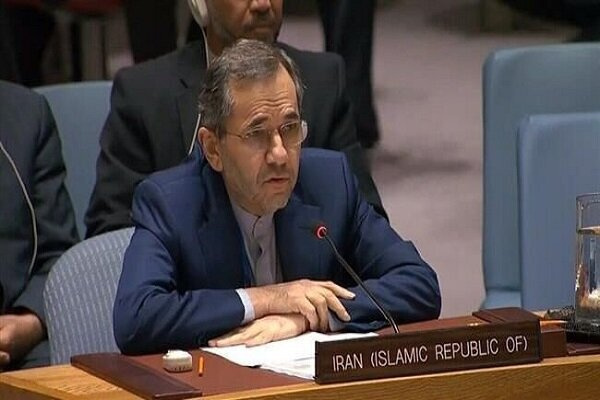Iran’s envoy to UN: Maximum pressure still continues

“The incumbent U.S. administration's claim of a policy shift toward the JCPOA is merely rhetoric. In actuality, the U.S. policy of maximum pressure remains in place, prohibiting Iran from utilizing its own financial resources overseas to acquire medicines,” he said, referring to the nuclear deal by its official term, the Joint Comprehensive Plan of Action (JCPOA).
"While the ongoing talks in Vienna are the first step in assessing the accuracy of the U.S.'s true political will to return to the JCPOA, the main and true test will come after verification, when it is proven that America has changed course, abandoned its failed policy of maximum pressure, and stopped its economic terrorism against Iran."
Former U.S. President Donald Trump withdrew from the JCPOA in May 2018, and his administration launched a “maximum pressure” campaign with the stated goal of compelling Iran to renegotiate “a better agreement.”
The Islamic Republic refused to give in to the pressure; instead, it adopted the policy “maximum resistance” that included economic measures to counter the bans, such as reducing reliance on oil incomes.
The current U.S. government, led by Joe Biden, claims it wants to right Trump's wrongs and rejoin the deal, but it is displaying a strong preference for keeping some of the bans in place as a tool of leverage.
Before the Islamic Republic reverses its remedial measures, Tehran asks that all sanctions be lifted in a verifiable manner.
Takht Ravanchi further stated, "The UN Security Council (UNSC) adopted a deadly silence in the early days of 2020, when the U.S. martyred regional counter-terrorism heroes, including General Soleimani, in a terrorist act at the direct instruction of its president. A few days later, the U.S. president threatened to bomb 52 locations, including key cultural sites in Iran.”
"Of course, when the U.S. offered a draft resolution to impose an arms embargo on Iran the same year, 13 UNSC members unequivocally rejected it."
When the Trump administration attempted to use the snapback mechanism against Iran, the same 13 UNSC members rejected the U.S. effort. They said that the U.S. had forfeited its right to invoke the snapback mechanism as a result of its withdrawal from the JCPOA.
Envoys from Iran and the P4+1 group of countries — Britain, France, Russia, and China, plus Germany — have been meeting in Vienna since April to discuss removing sanctions, renewing the JCPOA, and getting the U.S. back into compliance.
The U.S. has sent a delegation to Vienna, but it will not be directly participating in the JCPOA Joint Commission meetings because Washington is no longer a party to the agreement. It has, however, had separate negotiations with the other JCPOA parties.
Source: Tehran Times

